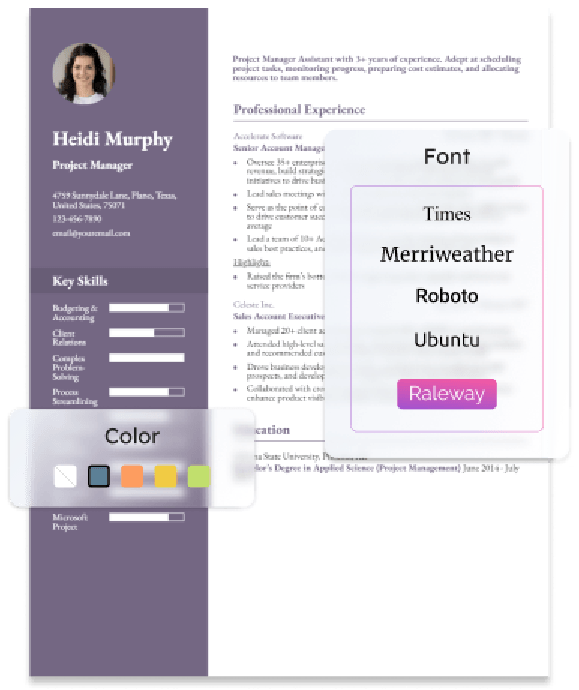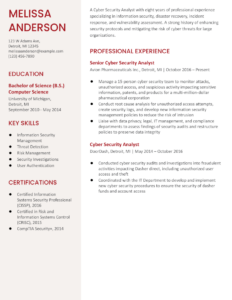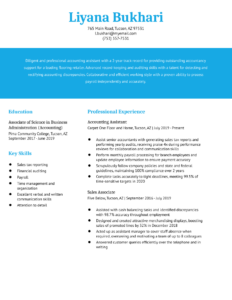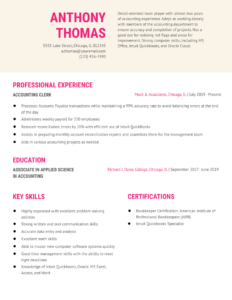How To Write a Nurse Resume
An attention-grabbing nursing resume will showcase your nursing certifications, experience, and accomplishments. To drive your nursing career forward, use specific information about the type of nursing work you’ve done before, including data such as patient load, efficiency rates, satisfaction rates, and number of team members you supervised, if applicable. Focus on your skills and tangible examples from your career to illustrate your unique background within the healthcare industry.
- Entry-Level
- Mid-Career
- Senior-Level
1. Write a brief summary of your nurse qualifications
Your profile, also known as the summary of qualifications, is one of the most important aspects of a resume. It’s the first thing the hiring managers see when they review your document, and as such, you’ll want to provide a compelling snapshot of your professional career.
One way to approach the summary is to incorporate three to four specializations related to the job you’re applying for in the first sentence, such as patient-centered care, patient education, acute care, and healthcare management. Leading with your specializations will show hiring managers that you have some of the key qualifications the organization seeks within seconds of reviewing your resume. Below, you’ll find examples to guide you as you create your professional profile:
Senior-Level Profile Example
Profile
A Registered Nurse with 10+ years of experience providing high-quality, compassionate care to pediatric patients. A proven track record of collaborating with multidisciplinary teams to enhance clinical workflows and drive positive patient outcomes.
Entry-Level Profile Example
Profile
A Registered Nurse with three years of experience delivering quality healthcare services to diverse patient populations. Adept at coordinating with nursing teams and medical personnel to drive positive patient outcomes in high-volume hospital environments.
2. Outline your nurse experience in a compelling list
The key to crafting a compelling professional experience section is to create bullet points that draw attention to your strongest career achievements within the healthcare sector. As you begin translating your experience into bullet points, you should establish a sense of scope for your achievements. For instance, if you worked in a high-volume hospital, you should showcase the nurse-to-patient ratio or the number of beds. These types of details will help hiring managers gain a better understanding of how your background can benefit their team and organization.
Senior-Level Professional Experience Example
- Communicate empathetically with diverse patients, build rapport, and drive the delivery of patient-centered care to achieve a 94% patient satisfaction rating
- Support an interdisciplinary team with direct nursing care for patients and assist with developing care plans to improve patient outcomes
- Lead, mentor, and coach a team of more than 15 LPNs and identify opportunities to enhance clinical workflows, resulting in a 10% reduction in average wait times
Entry-Level Professional Experience Example
- Completed a 150-hour practicum in the surgical ICU under the supervision of a registered nurse and ensured compliance with hospital protocols
- Prepared surgical tools and operating theaters, replenished medical inventory and equipment and ensured compliance with sanitation and hygiene regulations
- Oversaw the preparation of 12+ patients for surgery per day and supported post-surgical care before transfer to the recovery unit
3. Add nurse education and certifications
In addition to your education and nursing licensure, consider including any additional certifications or training courses you completed throughout your nursing career. This information is essential if you plan on pursuing a position in a specialized unit, such as oncology or pediatrics. Obtaining additional certifications will also show hiring managers that you have an array of knowledge of different areas of healthcare, which may differentiate you from the competition.
Certifications
Template
- [Certification Name], [Awarding Organization], [Completion Year]
Example
- Registered Nurse, State of Maryland, License #12345, 2010
- Advanced Cardiac Life Support Certified, American Heart Association, 2010
Education
Template
- [Degree Name]
- [School Name], [City, State Abbreviation] [Dates Enrolled]
Example
- Bachelor of Science (B.S.) Nursing
- College of Notre Dame, Baltimore, MD, September 2014 – June 2018
4. Make a list of your nurse-related skills and proficiencies
Applying to jobs doesn’t just mean impressing the hiring manager. It means getting past the applicant tracking systems (ATS). An ATS automatically sorts resumes into categories and highlights candidates with the right keywords, instantly identifying the best matches for each job posting. In practical terms, the more keywords you manage to use in your resume, the more likely you are to make it to the hiring manager’s desk and land an interview. Here are some of the phrases you might want to include to showcase your skills as a nursing applicant:
| Key Skills and Proficiencies | |
|---|---|
| Activities of Daily Living (ADLs) | Acute Care |
| Case Management | EKGs |
| Electronic Medical Records (EHR) | HIPAA |
| Medication Administration | Oncology |
| Orthopedics | Patient-Centered Care |
| Patient Discharge | Patient Intake |
| Patient Relations | Pediatric Care |
| Post-Operative (Post-Op) Care | Surgical Care |
| Telemetry | Treatment Planning |
| Physical Examinations | Pre-Operative (Pre-Op) Care |
| Trauma Care | Triage |
| Wound Care | |
How to Pick the Best Nurse Resume Template
As a nursing professional, you must select a well-organized and straightforward template. If your template has bulky graphics or distracting colors, you may draw the hiring manager’s eye away from your accomplishments. When in doubt, you should choose a well-structured template that keeps the reader’s focus on why you’re qualified for the position rather than focusing only on visual appeal.
Nurse Text-Only Resume Templates and Examples
- Entry-Level
- Mid-Career
- Senior-Level
Amar Singh
(123) 456-7890
[email protected]
LinkedIn | Portfolio
123 Bedford Avenue, New York, NY 12345
Profile
A Registered Nurse with seven years of experience providing high-quality, compassionate care to diverse patient populations. A proven track record of collaborating with multidisciplinary teams to enhance clinical workflows and drive positive patient outcomes.
Professional Experience
Registered Nurse, St. Andrew’s Hospital, New York, NY
October 2019 – Present
- Achieve patient satisfaction ratings of over 93% YOY, communicate empathetically with diverse patients, and drive the delivery of patient-centered care
- Coordinate events to provide long-term patients with entertainment options and activities to raise morale of patients suffering from debilitating illnesses
- Collaborate with local nonprofits on fundraisers to expand the hospital children’s library and incorporate tablet computers and game consoles
Registered Nurse, Brooklyn Medical Center, New York, NY
May 2016 – October 2019
- Delivered high-quality care to a diverse range of patients at a trauma center with over 300 beds and a 1:5 patient ratio
- Coordinated with multidisciplinary teams to improve care delivery, resulting in a 15% increase in patient satisfaction
- Served as the voice of the Trauma Center on committees such as the JCAHO Readiness Taskforce and the Readmission Reduction Planning Committee
Certifications
- Registered Nurse, State of New York, License #123456, 2016
- Basic Life Support Certification, American Heart Association 2016
Key Skills
- Patient-Centered Care
- Clinical Operations
- Pediatric Care
- Electronic Health Records (EHR)
- Telemetry
Education
Bachelor of Science (B.S.) Nursing
Columbia University, New York, NY September 2012 – May 2016
Frequently Asked Questions: Nurse Resume Examples and Advice
What are common action verbs for nurse resumes?-
It’s easy to find yourself running short on action verbs during the resume-building process. Often there’s only a limited number of verbs you can use to accurately convey your work experience and career achievements, especially as a healthcare professional. Incorporating a mix of action verbs can enhance the impact of your bullet points and improve the reading experience. To help you keep your content fresh and compelling, we’ve compiled a list of action verbs you can use to craft your nurse resume:
| Action Verbs | |
|---|---|
| Administered | Analyzed |
| Communicated | Conducted |
| Coordinated | Collaborated |
| Delivered | Diagnosed |
| Enhanced | Identified |
| Interfaced | Implemented |
| Improved | Led |
| Managed | Oversaw |
| Performed | Provided |
| Resolved | Supported |
| Treated | |
How do you align your resume with a job posting?-
Although nursing positions are expected to increase by 6% over the next decade, according to the Bureau of Labor Statistics, you’ll still need to tailor your resume to the job description to maximize your chances of landing the interview. One of the most important aspects of creating a strong nurse resume is highlighting the nuances of your experiences within the healthcare industry.
For instance, if you’re applying to an organization with a strong reputation for patient-centered care standards, you may want to include insights showcasing your patient advocacy history. If you’re pursuing a position in an oncology unit, you might consider emphasizing your background in interfacing with cancer patients or supporting physicians during surgeries. Tailoring your resume to individual job postings is the best way to differentiate yourself from the competition during the job search process.
What is the best nurse resume format?-
You should always use a reverse chronological format when crafting your nurse resume. This will ensure that your most recent achievements are featured at the top of your document. It’s best to avoid using a functional resume format in most instances, as this approach highlights skill sets without providing context or specific accomplishments for the hiring manager.

Although not every job posting will require a cover letter, many organizations still ask for them during the hiring process. To maximize the impact of your cover letter, you’ll want to mention something unique about the hospital’s reputation or work culture. Including this information will show hiring managers that you’ve researched beforehand and are genuinely interested in the position. For more guidance, you can visit our nurse cover letter guide.
Craft your perfect resume in minutes
Get 2x more interviews with Resume Builder. Access Pro Plan features for a limited time!







